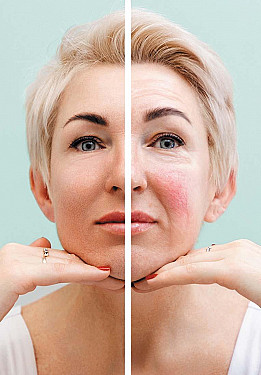Answers to why you itch all over
Here's what it takes to identify potential causes and find relief.
- Reviewed by Anthony L. Komaroff, MD, Editor in Chief, Harvard Health Letter; Editorial Advisory Board Member, Harvard Health Publishing

It's hard to get through daily activities when you itch all over. The widespread discomfort, known as generalized itching, is distracting and frustrating. When its cause is unclear, it's difficult to know how to find relief.
To help navigate this challenge, we turned to Dr. Martina Porter, a dermatologist at Harvard-affiliated Beth Israel Deaconess Medical Center.
Q. How concerning is generalized itching?
A. Dr. Porter: It's something that we take seriously. It can have an extremely negative impact on someone's quality of life, particularly if it disturbs sleep.
Q. How common is the condition?
A. Dr. Porter: It's much more common than you'd expect. An estimated 8% to 16% of the total population can report having generalized itching in the past 12 months. And about 20% of the population will experience generalized itching in their lifetime.
Q. What causes generalized itching?
A. Dr. Porter: Generalized itching can be caused by dry skin, severe cases of certain skin conditions, or skin changes that occur with age. Widespread itching might also be due to conditions that don't have obvious signs on the skin. Examples include diabetes, thyroid disease, kidney disease, liver disease, cancer, blood disorders, nerve-related causes, and some psychiatric conditions. HIV infection and medications can also cause itch, as can pregnancy.
Q. How do you pinpoint the cause when it isn't obvious?
A. Dr. Porter: That requires a bit of detective work. We take a thorough health history, ask about all signs and symptoms, and examine all of the skin. We check the lymph nodes to see if they're swollen: if so, that could be a sign of cancer or an infection. We consider the distribution of itching to figure out if this is really generalized all-over itching, which points to an internal cause, or just localized itching, which is usually due to an exposure the body is reacting to or a nerve-related cause. When it is generalized itching, we usually order blood tests to help identify suspected internal causes. Some people may also need imaging tests to look for signs of cancer, although that's rare.
It can take time to identify the cause, but we still try to treat the itch while we investigate.
Q. What are treatments for generalized itching?
A. Dr. Porter: Treatment must be tailored to the underlying condition causing generalized itching. So if you have diabetes or thyroid disease, we need to treat that. We might also prescribe topical, oral, or injectable medications to help with the itch, or phototherapy that uses properties of ultraviolet light to decrease inflammation and itch.
Sometimes people are tempted to try and treat itching at home by taking antihistamines, such as diphenhydramine [Benadryl], loratadine [Claritin], fexofenadine [Allegra], or cetirizine [Zyrtec]. These medications can be helpful for hives or allergic causes of itching, but we try to limit their use for generalized itching in older people because of a potential increased risk of dementia.
Q. Are any home remedies helpful?
A. Dr. Porter: Dry skin can be very itchy, which makes generalized itching worse. So it is important to moisturize, particularly in the colder, less humid winter months.
For those who suffer from very dry skin or eczema, we recommend specific showering and bathing techniques, such as using lukewarm rather than hot water; using soap only on the armpits, genitals, feet, and face; and moisturizing everywhere immediately after bathing before your skin has a chance to fully dry.
There are many over-the-counter options for moisturizers, and some contain menthol, pramoxine, camphor, or capsaicin. Those ingredients can help alter nerve signaling and may decrease itch signals — although some ingredients may instead cause a burning, numbing, or cooling sensation. Applying over-the-counter 1% hydro-cortisone cream or ointment can help calm mild inflammation if itching is worse in a particular spot.
Q. Is it possible to stop the itch?
A. Dr. Porter: Yes. You don't have to suffer with constant itching. Make an appointment with a dermatologist. Be sure to tell the doctor where the itching is occurring. And try some home remedies until your visit.
Image: © Kinga Krzeminska/Getty Images
About the Author

Heidi Godman, Managing Director
About the Reviewer

Anthony L. Komaroff, MD, Editor in Chief, Harvard Health Letter; Editorial Advisory Board Member, Harvard Health Publishing
Disclaimer:
As a service to our readers, Harvard Health Publishing provides access to our library of archived content. Please note the date of last review or update on all articles.
No content on this site, regardless of date, should ever be used as a substitute for direct medical advice from your doctor or other qualified clinician.
















